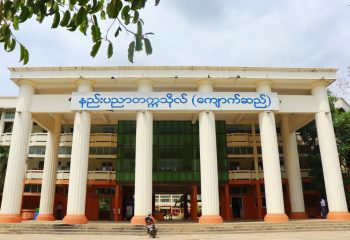Introduction
Information Technology Department in Kyaukse Technological University was established in 1999. Therefore Information Technology Department of KTU is 16 years old in engineering education service.
Information Technology department have 300 undergraduate students who are learning First year to Sixth year receptively and provides Undergraduates Information Technology engineering students.
Vission
To become the standard of excellence for IT courses
To achieve excellence in IT by imparting in-depth knowledge to the students and furnishing to the industrial demands and society needs.
Mission
To qualify our competent students for employment in IT fields
To be a leading provider depending on the demands of business, industry and the community
PEO 1: Produce multi-skilled engineer who can apply fundamental scientific and engineering principles to solve complex engineering problems systematically, creatively and innovatively, with the aids of modern analytical and design tools including research methodology, to contribute to the advancement of ICT engineering knowledge and practice.
PEO 2: Nurture engineer who is able to communicate and manage effectively as a leader and/or team player in diverse destinations of IT engineering and in multi-disciplinary environment, striving for responsible leadership and engineering innovations.
PEO 3: Foster development of engineer who practices professional virtues with strong commitment to moral and ethical responsibilities in the course of IT engineering practice, applies principles of sustainable development with considerations for natural resources, public health and safety, and environment, and is committed to personal holistic development through life-long learning.
1. Apply knowledge of mathematics, natural science, engineering fundamental and engineering specialization concepts to solve complex IT engineering problems.
2. Identify, formulate, conduct research literature and analyze complex IT engineering problems to substantive conclusions by using principles of mathematics, natural sciences and engineering sciences.
3. Design solutions for complex IT engineering problems and design systems, components or processes that meet specified needs with appropriate consideration for public health and safety, cultural, societal and environmental considerations.
4. Conduct investigation into complex IT problems using research based knowledge and research methods including design of experiments, analysis and interpretation of data, and synthesis of information to provide valid conclusions.
5. Create, select and apply appropriate techniques, resources, and modern ICT tools, including prediction and modeling, to tackle complex IT engineering problem with an understanding of the limitations.
6. Apply and contribute IT engineering knowledge to assess societal, health, safety, legal and cultural issues and the consequence of responsibilities relevant to professional engineering practice and solutions to complex engineering problems.
7. Understand and evaluate the sustainability and impact of IT engineering work in the solutions of complex engineering problems in societal and environmental contexts.
8. Apply ethical principles and commit to ethics, responsibilities and norms of engineering practice of IT engineering to address ethical dilemmas.
9. Function effectively as an individual, and as a member or leader both in diverse teams and in multi-disciplinary settings.
10. Communicate effectively on complex IT engineering activities being cooperated with the engineering community and society widely, that program will be able to comprehend and write effective reports and design documentation, make effective presentations, and provide explicit instructions.
11. Demonstrate knowledge and understanding of IT engineering management principles and economic decision-making and apply these to one’s own work, as a member and leader in a team, to manage IT projects in multidisciplinary environments
12. Recognize the necessity and plan to set up the appropriate commitment to engage in independent and life-long learning of the broadest technologies and new trend.
Course specification
Download PDF File Here ⇒ IT-11013 Introduction to Computer Systems
Download PDF File Here ⇒ IT-21011 Basic Electricity and Electronic
Download PDF File Here ⇒ IT-21015/22015 Programming Language in C++
Download PDF File Here ⇒ IT-21012 Data communications
Download PDF File Here ⇒ IT-21021 Digital Logic Design
Download PDF File Here ⇒ IT-21025 Web Development Technology I
Download PDF File Here ⇒ IT-31022 Computer Network
Download PDF File Here ⇒ IT-31016 Database Management System
Download PDF File Here ⇒ IT-31055 Data Structure
Download PDF File Here ⇒ IT-31045 & 32045 Programming Language in Java
Download PDF File Here ⇒ IT-31035 Web Development Technologies II
Download PDF File Here ⇒ IT-41032 Advanced Computer Network
Download PDF File Here ⇒ IT-41026 Advanced Data Management Techniques I
Download PDF File Here ⇒ IT-41023 Computer Architecture and Organization
Download PDF File Here ⇒ IT-41033, Operating Systems Operating System Concepts
Download PDF File Here ⇒ IT-51014 Cloud Computing
Download PDF File Here ⇒ IT-51037 Digital Image Processing
Download PDF File Here ⇒ IT-51027 Digital Signal Processing
Download PDF File Here ⇒ IT-51043 Embedded Systems
Download PDF File Here ⇒ IT-51065 Software Engineering
Download PDF File Here ⇒ HSS-61011 Humanities and Social Science
Download PDF File Here ⇒ IT-61052 Network Planning and Management
Download PDF File Here ⇒ IT-61075 Project Management
Download PDF File Here ⇒ IT-61042 Wireless and Mobile Communications Wireless Communications and Networking (4th edition) by VIJAY GARG


